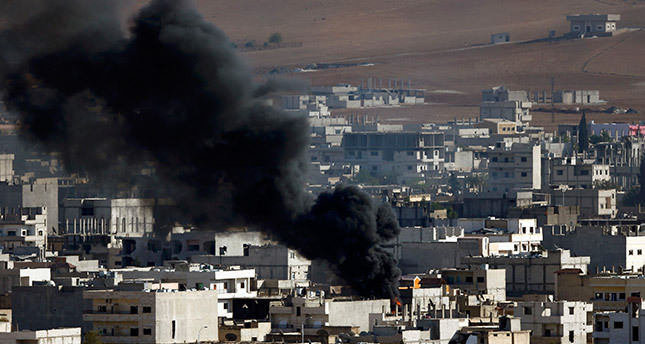PYD and US release contradictory statements

PYD leader Salih Muslim, who recently met with KRG President Barzani, said the armed Kurdish factions are very close to saving Kobani from ISIS militants while U.S. officials warned the town may fall to ISIS
The co-leader of the Democratic Union Party (PYD), Salih Muslim, held a meeting in Iraq's Duhok with the Kurdish Regional Government (KRG) President Masoud Barzani over the ongoing battle with Islamic State of Iraq and al-Sham (ISIS) militants. Although the details of the meeting in which other representatives of different Kurdish groups attended are unclear, Muslim said that the groups are close to liberating the town and pushing ISIS back completely. On the airstrikes by the U.S.-led anti-ISIS coalition, Muslim said, "The airstrikes on [ISIS] militants have been very helpful for us. I hope we will declare victory."When asked about cooperation with the KRG, he said, "The aid we receive is insufficient. We expect Irbil to deliver more aid during our fight against ISIS." He added, "The war is not only in Kobani but also in the other Kurdish cities. If anyone wants to defend his or her lands, we welcome them." Despite the criticism, Barzani said, "ISIS has defeated the armies of [Iraq and Syria]. Yet the Kurdish people, in a unified way, have been resisting against the group."Despite the positive statements made by the Kurdish side, Rear Admiral John Kirby, a Pentagon spokesman, said, "We all have to prepare for the eventuality, the possibility that Kobani could fall. Likewise, we ought to be prepared for the eventuality that other towns and other villages, other pieces of ground, will either fall to ISIS or we may not be able to dislodge them from [ISIS] for quite some time. The more they want it [and] the more resources they apply to it, the more targets we have to hit. We know we have killed several hundred of them." He added that the strikes had degraded ISIS' ability to relocate and sustain its forces, "and it is not like they have a whole heck of a lot of ability to reconstitute [their forces]."The siege of the mainly Kurdish town on the border with Turkey has become a focus of the coalition to halt the militants, who have seized swaths of territory in Syria and Iraq. The U.N. has warned of a massacre if the town falls to the militants who now control nearly half of it. Kirby said only a few hundred civilians remained in the town, also known as Ayn al-Arab. He also suggested that improving weather conditions in Iraq would bolster the intelligence needed for air strikes. "As the weather improves, I think you will see continued pressure applied as appropriate and as we are able to," he said.The Pentagon's comments came during increased scrutiny in the U.S. of President Barack Obama's strategy to defeat the group in Iraq and Syria without sending American ground troops into combat. On Tuesday, Obama told military leaders from more than 20 countries working with Washington to defeat ISIS that he was deeply concerned about the group's advances in Kobani and in western Iraq. Still, Obama did not hint at any change in strategy. Republican Senator John McCain, a frequent Obama critic and his opponent in the 2008 election, said over the weekend, " [ISIS is] winning and we are not." Asked about McCain's remarks, Kirby said, "It is a mixed picture. We know we are having some success. We know we're making progress. But it's going to take a long time. And just as readily, I will say there is going to be days, there is going to be moments, where we're set back."
Last Update: October 17, 2014 09:51
